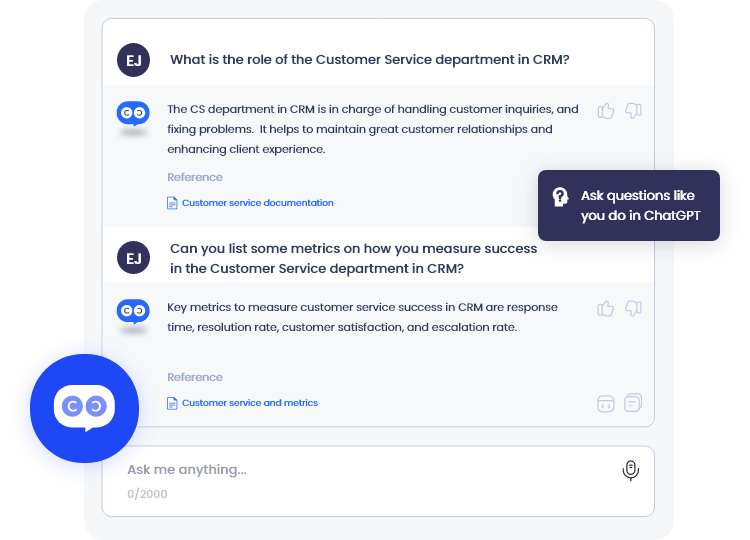GPT-Enabled Chatbots:
Answer to the Common CRM Challenges
Customer engagement
The only conventional methods of customer engagement in CRM are phone calls and emails. As a result, clients experience longer wait times and a lack of personalization. But with GPT-enabled chatbots for CRM in place, customer engagement can be improved by 24/7 personalized interactions.
Cost
Customer Relationship Management is an industry that involves hiring and training a staff of customer service representatives, which can be expensive for businesses. But, thanks to GPT-enabled chatbots, the expense of providing customer service to organizations can be greatly reduced. Automated client interactions can decrease their reliance on human customer care agents.
Support ticket management
Usually, the support tickets are raised by human agents, which can lead to inconsistencies and longer resolution time. However, the GPT chatbots have automated support ticket management with improved consistency and quicker resolutions. This also helps to maintain transparency and reduces the frustration of customers.
Feedback collection
CRM systems generally collect feedback through emails or surveys, making it difficult to implement the feedback promptly. With GPT chatbots in place, collecting feedback has become easier through conversational interaction. It also allows businesses to address the issues quickly.
How DocoMatic, an AI-powered Chatbot Solution,
Helps the CRM Industry?

Quick access
A crucial component of client relationship management is quick access. DocoMatic offers effective and accurate search capabilities powered by AI. It helps the customer care representatives quickly obtain the relevant information data and address consumer inquiries. Due to this feature, the response times are shortened, leading to a better customer experience.
Multi-channel support
DocoMatic offers multi-channel support for CRM systems to interact with their customers. It includes messaging apps, web chat, and email, allowing users to choose their preferred channel. This makes it easier for companies to cater to individual customers through all available channels.
Personalization
AI-powered DocoMatic analyzes customer data to offer personalized solutions to customers. This feature helps businesses build stronger customer relationships and boost customer retention.
Analytics and insights
Businesses can gain an understanding of their customers’ behavior with the help of analytics and insights. This aids the CRM system in making informed decisions regarding consumer engagement tactics. Businesses can use this feature to enhance their CRM initiatives and increase customer loyalty and satisfaction.
Streamline Daily CRM Operations with DocoMatic
24/7 availability
GPT-Enabled Chatbots from DocoMatic are available 24/7, meaning the customers can get support anytime and anywhere. It also reduces the workload of the human agents to focus on more complex issues. Thus helping businesses to save time and money while improving the overall customer experience.
Cost-effective
A CRM support team needs many human representatives. However, with automation, DocoMatic can handle multiple queries simultaneously, reducing the overall cost of customer support operations. This is mainly helpful for small and medium-sized businesses.
Improved customer experience
DocoMatic employs a machine learning algorithm to decipher the intent of customer inquiries. Customers will receive more individualized and meaningful responses, enhancing their overall experience and speeding up resolution. You can get quick document search results with DocoMatic.ai’s chatbot.
Data analysis
GPT-based chatbots help collect and analyze data in real-time when utilized in CRM operations. This analysis offers insightful information about customer demands and preferences. Later on, it will assist businesses in making data-driven decisions to enhance their general business operations and customer service.
Frequently Asked Questions
GPT-enabled chatbots, or generative pre-trained transformers, use algorithms to understand natural language processing (NLP) more humanistically. On the other hand, traditional chatbots use pre-written rules or scripts to respond to customer queries.
GPT chatbots can be more personalized as they are already trained on massive volumes of data. Whereas traditional chatbots cannot learn from customer interactions.
GPT-enabled chatbots benefit CRM in several ways:
- They provide more personalized responses, leading to improved customer satisfaction.
- It can learn from customer interactions that effectively manage customer relationships.
- Chatbots can handle multiple customer inquiries at a time.
- GPT chatbots reduce human agents’ involvement, reducing business expenses.
Businesses can link chatbots with their CRM systems to obtain client information and deliver personalized responses. Thus, increasing the chatbot’s efficiency in managing customer relationships. They can also track and evaluate the chatbot’s performance to identify areas for development and enhance their CRM plans.
Even though GPT chatbots can manage numerous inquiries at once and provide more customized answers. Yet, they cannot replace actual customer support agents in CRM. The reason is that customers might need human empathy and problem-solving skills for complex interactions.
To sum up, GPT-enabled chatbots can complement human customer support agents but cannot replace them.
GPT-enabled chatbots can play a key role in improving customer retention in CRM. It can offer tailored recommendations by getting to know the needs and preferences of the consumer.
This can improve customer satisfaction and loyalty, leading to increased customer retention. Moreover, it speeds up response times by dealing with several requests simultaneously, thus preventing customers from leaving due to frustration or lack of attention.
